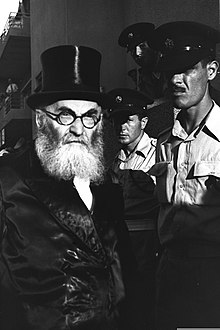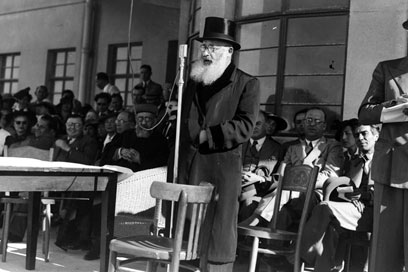
During Seudah Shlishit at the YU Kollel Shabbaton in which my family participated this past Shabbat,
Rabbi Assaf Bednarsh, one of the Roshei Yeshiva made the following announcement to the Kollel: "Please make sure to finish eating bread by 4:42 to avoid the question of whether to bentch with
ya'aleh v'yavo. If you finish eating bread before that time, then according to 99% of the poskim, you only need to say
retezei during
birkat hamazon."
(Just to explain the issue, when Rosh Chodesh falls on a Sunday, birkat hamazon for Shalosh Seudot presents a halachic conundrum. Normally, we have no problem extending Shabbat into Saturday night, and when one recites birkat hamazon after dark we nevertheless recite
retzei as normal. Yet, when
Rosh Chodesh falls on a Sunday, if you extend Shabbat, you run into Rosh Chodesh which raises the issue of what do with during birkat hamazon. Do you recite
retzei only, as you normally would? But it's after dark, and Rosh Chodesh has already arrived.
Ya'aleh V'yavo only? But you began the meal on Shabbat, and essentially it's a Shabbat meal. What about just saying both? That also makes little logical sense, as the two days don't chronologically overlap. Any way you slice it, it's a dicy halachic situation, hence Rabbi Bednarsh's sage advice: Avoid the situation by consuming your bread early.)
I, of course, piped up. "What if I don't want to avoid the
safek situation? What if I want to eat bread later? What should we do then?
He thought for a minute and said, "Still just say
retzei."
Yet, his suggestion makes me wonder: is it better to avoid situations of
safek - halachic doubt? Should I go out of my way to avoid situations in which I'll find myself in halachic conundrums which I then need to sort out? Or, should I live my life and deal with the halachic issues as they arise, looking for the proper resolution for each
safek situation? Usually I choose the latter. God put us in the world to live Torah lives, and we must apply the rules of halachah to each situation as it arises. I don't go out of my way to avoid certain situations which will then force me to make a challenging halachic choice.
At least that's what I thought. And then an offhand comment by Rabbi Michael Broyde caught my attention.
During a shiur that he gave at YU's popular Kollel Yom Rishon, Rabbi Broyde discussed some of the halachic conundrums that Orthodox Jews face in the workplace. He stated the obvious fact that most frum Jews don't have the luxury of dealing with only Orthodox people in their workplace, and therefore they face numerous challenges in that they knowingly or unknowingly assist Jews in the violation of halachah. (For example, a Jewish doctor prescribing contraceptives to a Jewish woman is directly aiding her in non-halachic sexual behavior.) He said, "Some of us are privileged to have a job in which we only work with Orthodox Jews, but most of us don't." Then he added, almost as an aside, "Most of us don't even want such a job." (to which he received a smattering of laughter).
His side comment caught my attention. I work in a religious environment where I interact almost entirely with religious Jews. I have never had to pass a coworker a ham sandwich during a work-related meal, nor have I ever felt that I was abetting a fellow Jew in chillul Shabbat. I'm clearly in the minority and don't think that being in Israel is an better that the Diaspora on this matter. (In fact it might be worse. Outside of Israel there's a strong chance that most of your coworkers are not Jewish, so passing them the ham presents no issue. But in Israel, the vast majority of your coworkers are Jewish, and if you send them the file right before Shabbat, it's a sure bet that they're violating the Shabbat.)
But I love the fact that I don't face these types of ethical and halachic challenges in the workplace. I feel fortunate that we close for every Jewish holiday without fail (and the Israeli ones too). I appreciate that kashrut is a given. And I'm not entirely sure that I'd want to confront the halachic challenges that most everyone else faces and the compromises that they demand. In many ways, while we might need to confronting situations of safek, it's surely easier to avoid them.
Which is exactly what I did at Seudah Shlishit. I would have said only retzei during birkat hamazon anyway. But I finished my bread early.
 Growing up, everyone in my family lit the Chanukah menorah. Everyone, that is, except my mother. After my father lit, we would go in the order of the children, from oldest to youngest, including my sisters. I imagine that if you grew up in an Ashkenazic home, your family followed a similar practice. There's only one problem: it doesn't really make much sense. If my mother didn't light, then why did my sisters - especially after they became Bat Mitzvah? And if adult women should light, shouldn't mothers light as well?
Growing up, everyone in my family lit the Chanukah menorah. Everyone, that is, except my mother. After my father lit, we would go in the order of the children, from oldest to youngest, including my sisters. I imagine that if you grew up in an Ashkenazic home, your family followed a similar practice. There's only one problem: it doesn't really make much sense. If my mother didn't light, then why did my sisters - especially after they became Bat Mitzvah? And if adult women should light, shouldn't mothers light as well?














